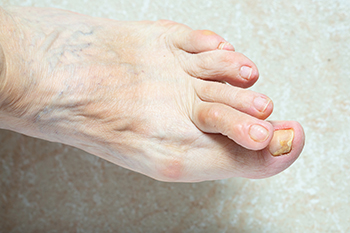Causes and Associated Conditions of Hammertoe
Tuesday, 26 November 2024 00:00
Hammertoe is a deformity in which one or more toes bend downward at the middle joint, causing a claw-like appearance. This condition can result from a variety of causes, including muscle imbalances, poor footwear choices, or inherited traits. In some cases, hammertoe is associated with underlying health conditions such as rheumatoid arthritis, or RA, where joint inflammation can lead to deformities in the toes. Charcot-Marie-Tooth disease, a genetic disorder that affects peripheral nerves, can also cause muscle weakness and imbalance, contributing to the development of hammertoe. Another common cause is an elongated second metatarsal bone, which can lead to abnormal pressure on the toes, causing them to bend. Symptoms of hammertoe include pain, difficulty walking, and corns or calluses forming on the affected toes. If you have developed a hammertoe, it is suggested that you consult a podiatrist who may guide you toward wearing corrective footwear, splints, or, in severe cases, surgery to realign the toe.
Hammertoe
Hammertoes can be a painful condition to live with. For more information, contact Brian D. Jackson, DPM from Neuhaus Foot and Ankle. Our doctor will answer any of your foot- and ankle-related questions.
Hammertoe is a foot deformity that affects the joints of the second, third, fourth, or fifth toes of your feet. It is a painful foot condition in which these toes curl and arch up, which can often lead to pain when wearing footwear.
Symptoms
- Pain in the affected toes
- Development of corns or calluses due to friction
- Inflammation
- Redness
- Contracture of the toes
Causes
Genetics – People who are genetically predisposed to hammertoe are often more susceptible
Arthritis – Because arthritis affects the joints in your toes, further deformities stemming from arthritis can occur
Trauma – Direct trauma to the toes could potentially lead to hammertoe
Ill-fitting shoes – Undue pressure on the front of the toes from ill-fitting shoes can potentially lead to the development of hammertoe
Treatment
Orthotics – Custom made inserts can be used to help relieve pressure placed on the toes and therefore relieve some of the pain associated with it
Medications – Oral medications such as anti-inflammatories or NSAIDs could be used to treat the pain and inflammation hammertoes causes. Injections of corticosteroids are also sometimes used
Surgery – In more severe cases where the hammertoes have become more rigid, foot surgery is a potential option
If you have any questions please contact one of our offices located in Columbia and Pulaski, TN . We offer the newest diagnostic and treatment technologies for all your foot and ankle needs.







